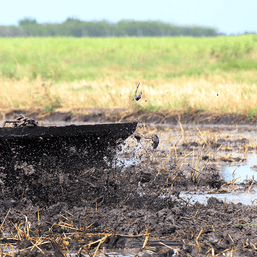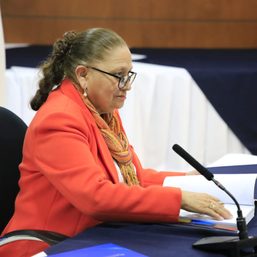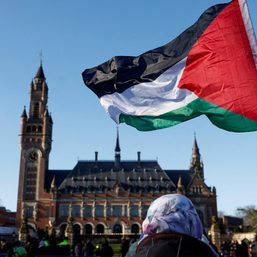SUMMARY
This is AI generated summarization, which may have errors. For context, always refer to the full article.
![[OPINION] No seat at the table: Where are youth in UN’s anticorruption conference?](https://www.rappler.com/tachyon/2023/12/youth-anti-corruption-conference-december-13-2023.jpg)
As the world grapples with pressing development issues, two important United Nations conferences are currently happening simultaneously: the UN Framework Convention on Climate Change’s Conference of the Parties (COP 28) addressing the climate crisis and the UN Convention Against Corruption’s Conference of the State Parties (CoSP 10) addressing corruption.
The climate crisis and corruption represent two critical challenges facing humanity, both with far-reaching consequences. However, a quick glance would show the stark contrast between the two conferences. Under the Dubai heat, COP 28 has the massive participation of various stakeholders, with the burning presence of hundreds of young activists putting active pressure during negotiations.
In contrast, CoSP 10 seems to reflect Atlanta’s cold weather and misses out on youth’s energy and enthusiasm: it is more quiet and solemn, with only around a dozen young people attending the conference, and limited, if not completely absent, means of participating in negotiations.
With corruption cited as a major barrier in fulfilling the 2030 Agenda, where are the youth in CoSP? Why are they not as involved as they are in conferences like COP, despite the devastating impacts of corruption?
Why youth should be at CoSP
During the “Young Changemakers” pre-event, we members of UNODC’s Youth Advisory Board presented the results of our regional youth consultations. Though presented separately, we cited common themes regarding youth engagement in anti-corruption.
First, contrary to people’s belief that corruption is too “intangible” or “indirect” to feel, young people are aware that they are victims of corruption. They know that corruption is the root of the poor quality of public services, the lack of job opportunities, and the economic hardships they experience. They even cite corruption as the reason for their fear of speaking up about social issues or participating in civic and political affairs.
Second, young people want to get involved. Some do so through individual means (reading or sharing posts online, or simply educating themselves about corruption issues) and collective means (by joining youth groups, joining grassroots movements, calling out corrupt practices).
Third, despite wanting to get involved, they are limited by common barriers: lack of awareness and anti-corruption education, fear of reprisal, lack of youth whistleblower mechanisms, and lack of youth representation in decision-making processes. Because of these, young people feel that they will be put at risk when they call out corrupt practices.
These reasons are more than enough to emphasize the need for young people to be present and engaged at CoSP, where decisions and resolutions made serve as the State Parties to follow and implement in their jurisdictions over the next two years.
Small steps, high barriers
Despite the small number of young people in Atlanta, his year’s CoSP is surprisingly its most youth- and civil society-inclusive iteration yet.
According to UNODC’s Executive Director Ghada Waly, CoSP 10 is hosting over 2,300 participants, including over 900 representatives from NGOs, the private sector, and governments both in person and online.
Throughout the week, the conference will host several firsts: a civil society forum and a “Young Changemakers” forum as pre-CoSP events, several side events with youth representatives and hackathon winners as speakers, and the delivery of a youth statement in the conference’s plenary session.
Despite these, there are still many restrictions at the conference.
First, negotiations have already occurred in various events before the actual conference, so there is not much room for young people to influence negotiations in Atlanta itself. Second, access to the full list of the State Parties’ delegations is prohibited, which makes it more difficult to engage your country to lobby or get involved in negotiations. Third, sending youth delegates has not been promoted as a practice, which reflects how youth representation in anti-corruption is not encouraged and not a priority.
So yes, youth are at CoSP10. They are relatively more present now than any other CoSP. But having spaces to speak is just the first step towards meaningful youth engagement in anti-corruption. What is more important and impactful are opportunities for young people to influence the decisions and resolutions that will be adopted by State Parties at CoSP.
By not involving young people in CoSP discussions, we are missing out on the perspectives and innovative ideas that could help combat corruption more effectively. We are missing out on the opportunity to pressure State Parties to invest in incorporating integrity and anti-corruption in their education system. We pass over the opportunity to influence policies that will protect young activists and whistleblowers who are risking their lives to combat corruption.
Bridging the gap: Youth power at CoSP
To bridge this gap, it is crucial to rethink the approach to CoSP and make it more inclusive of youth participation. This includes looking at the bigger picture: finding opportunities for meaningful youth engagement in the UNCAC implementation.
This means expanding opportunities for youth to attend and speak at pre-CoSP negotiation meetings and CoSP activities. Youth representation must be institutionalized in decision-making processes involving anti-corruption strategies and the UNCAC implementation. State Parties must also be encouraged to send a counterpart youth delegation in all UNCAC-related activities.
In conclusion, the limited presence of young people at CoSP 10 is a missed opportunity that needs to be addressed urgently. Corruption is a global problem that affects young people’s lives, and their perspectives are invaluable in shaping effective anti-corruption strategies.
By engaging and involving youth in CoSP discussions, we can harness their energy and creativity to strengthen the fight against corruption and ensure a more just and transparent future for all. It’s time for CoSP to follow COP’s lead and embrace the power of youth activism in addressing global challenges. – Rappler.com
Dexter Yang is the founder of GoodGovPH, a youth-led non-profit for good governance. He is one of the UNODC Youth Advisory Board’s representatives attending CoSP10 and will deliver the youth statement in one of its plenaries in Atlanta. He is pursuing his Juris Doctor degree at the University of the Philippines College of Law.
Add a comment
How does this make you feel?
![[OPINION] The youth are tired](https://www.rappler.com/tachyon/2023/03/tl-kids-tired.jpg?fit=449%2C449)
![[ANALYSIS] What they don’t tell you about the rule of law and corruption in PH](https://www.rappler.com/tachyon/2023/06/what-they-dont-tell-you-june-13-2023.jpg?fit=449%2C449)
![[Newspoint] A fighting presence](https://www.rappler.com/tachyon/2024/07/thought-leaders-a-fighting-presence.jpg?resize=257%2C257&crop=441px%2C0px%2C1080px%2C1080px)
![[ANALYSIS] Promoting PPP via a sufficiently empowered media](https://www.rappler.com/tachyon/2024/04/PPP-and-media.jpg?resize=257%2C257&crop=365px%2C0px%2C720px%2C720px)







There are no comments yet. Add your comment to start the conversation.